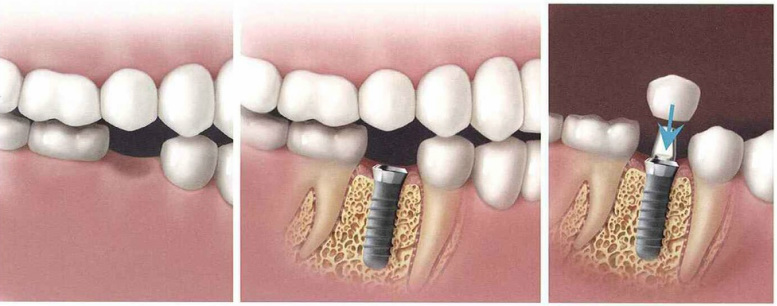What are dental implants?
A dental implant is a piece of titanium in the shape of a screw. It is placed into the jaw to replace a missing tooth. Over time, bone grows around the implant allowing it to fuse and helps to hold the implant in place – this is known as ‘integration’. An artificial tooth or crown is then attached the metal screw to fill in the gap left by the missing tooth. The crown is custom made to look like the surrounding teeth in the same shape, size and colour.
Implants can replace a single missing tooth or support a denture where several teeth are missing. Unlike dentures, which are removable, dental implants are fixed.
When can I have a dental implant placed?
The best time to replace a missing tooth is soon after it is lost as this will minimise complications of bone and gum loss that occur soon after tooth extraction. After 6 months approximately 50% of the bony ridge has already been lost. Timing is essential.
Am I suitable for dental implants?
If you have one of more teeth that are missing, or a loose fitting denture, then dental implants may be suitable for you.
Who will be placing my implant?
Education in dental implants can be anything from a weekend course to postgraduate tertiary qualifications. Dr Jonathan Tsun, the principal dentist, has a 2 year postgraduate diploma by examination in dental implants. He has extensive dental implant experience in a multiple of dental implant systems.
Questions to ask the clinician placing my implants?
What are your qualifications; is the dental implant system used reputable; is the implant crown made in a local Australian laboratory;
I’ve heard of teeth in a day on the radio. Can you do this?
While teeth can be replaced in a day, these treatments are often expensive and may not your expectations. Much of this marketing refers to all-on-4, which is a technique of supporting all teeth on 4 implants. Sometimes less implants can be utilised for a satisfactory result. Take the time to gain a second opinion from a clinician with extensive knowledge of implant dentistry.
Are mini-implants the same thing?
No. These implants are less than 3mm in diameter. A recent systematic review showed long-term data and success rates are not reported.
I have gum disease, will dental implants work?
Unfortunately, gum disease will affect implants just as it does teeth. Eventually implants can be lost too peri-implantitis. We strongly recommend treating gum disease prior to dental implants. If you have active gum disease, you are probably not an ideal candidate for dental implants
I have been told I need bone grafting. Where does this graft come from?
Augmentation of soft and hard tissues is a common procedure in implant surgery. Material can sourced from human, animal, and synthetic sources which each having their merits. You should discuss this with your implant dentist .
Can I have an implant the same day as the tooth extraction?
This part of implant dentistry is often referred to as immediate implants. When a tooth is removed it leaves behind an empty space. Implants must be placed in bone. Because there is an empty space, this makes placement of implants less ideal. You should discuss options with your implant dentist to see if you are suitable for immediate implants.
What happens during the dental implant procedure?
A dental implant is usually completed in stages over a few months.
Diagnostic bone x-rays are required to give the dentist/ specialist a very clear view of the bone levels in the mouth and where the implant can be placed safely.
A minor operation is completed to place the dental implant into the jawbone with local anaesthetic or with sedation so that the procedure is pain free. This is usually no worse than a tooth extraction.
3-6 months is required to allow bone to grow around the dental implant
Once the implant is stable an implant crown (tooth) is constructed and attached to the dental implant and is now ready to function like a natural tooth.

What to expect after a dental implant
After any of the minor procedures you may experience bruising, pain and swelling of the gums or face. You may also have some bleeding from the gums.
Soft foods are recommended after each procedure to let the dental implant site heal. Brushing and flossing and regular dental checkups are required for the long term success of an implant.
Implant procedures are conducted at Concord Dental Practice. For further information and a consultation on whether you are a suitable candidate for dental implant please concord our dental clinic on 9743 4001.